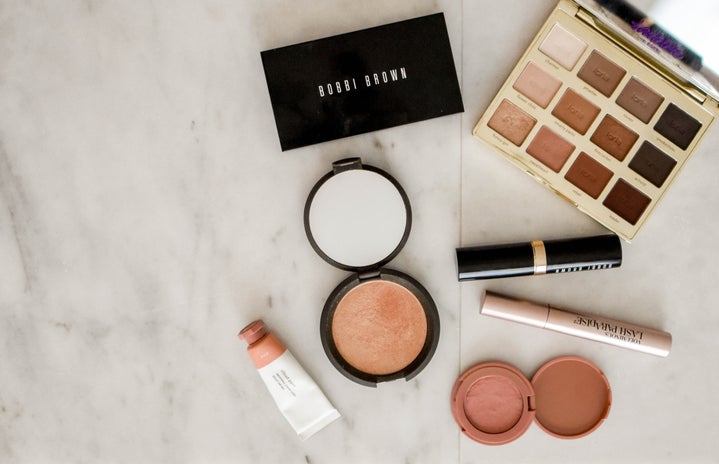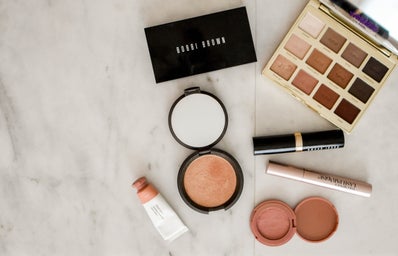Acne: we’ve all been there. Whether you’ve had one, a few, or too many pimples, acne is beyond frustrating.
Do you feel like you’re at the end of your rope with acne? Trust me, I’ve been there. I’ve battled acne since 4th grade and finally cleared it up in college, and I learned a thing or two along the way. Karen Limaye, a dermatology certified nurse practitioner (DCNP), discussed some great tips and products with us for collegiettes™. Read on, and clearer skin will be in your future!
What is Acne?
“There are a couple of different types of acne,” Limaye says. “Acne is basically caused by a disease of the pilosebaceous glands, which is the gland that is part of the hair follicles. There are many causes of acne. First, hormones cause these glands to enlarge, and then you have increased oil production. Because of the increased amount of oil that is coming through, the dead skin gets caught along the pores, then that leads to a condition which is either comodonal acne (a blackhead or whitehead) or papules.”
Aside from comodonal acne and papules, cysts can also appear. “An acne cyst can form when bacteria lives in the skin, and gets clogged inside the pore, causing it to multiply quickly. In turn, the pore becomes inflamed, and the deeper it goes into the skin, the bigger the cyst can get,” Limaye says.
Limaye explained that there are several ways you can help avoid acne.
Breaking the Breakout Cycle
Whether it be their cleansing routine, creating inflammation or overexposure to sunlight, there are common mistakes many collegiettes™ make when treating our skin.
Food and Your Face
As a collegiette™ food is a big part of our lives. Whether it includes going out to lunch with friends, or eating a late night snack, sometimes we don’t make the right choices, which aren’t the best for our skin. “The American diet has a lot of hormones and antibiotics in the food. Eating dairy products and meat products that don’t contain hormones and antibiotics may be helpful,” said Limaye. “Try to avoid high processed foods, since they are likely to cause breakouts.”
As Dr. Limaye stated, highly processed foods are most likely to cause acne. These are foods that have a lot of processed sugar, preservatives, or both. Foods like this include but are not limited to chips, cookies, and soda. Food additives like sweeteners and coloring should also be avoided. According to Acne.org, high processed foods, sugar and preservatives can all cause bacteria and inflammation in the pores of our skin. Eating these foods in moderation, or avoiding them altogether may help to keep your skin acne-free.
Wash, But Not Too Much
“A Mistake some patients make is that they over-wash their faces. They think scrubbing really hard will get their face clean, but scrubbing their face hard actually irritates the hair follicles, and makes them become inflamed, which can trap bacteria and it can cause acne,” said Limaye. Make sure that when you are washing your face, you are using gentle circular motions and drying your face off with a clean wash or towel to avoid putting dirt back onto your face. What’s important to remember, though, is that no matter how rushed you are in the morning, or how tired you are at night, always remember to wash your face. Avoiding contact between your hands and face may also help to keep your skin clean.
No Popping Allowed!
“Picking and squeezing pimples is also a horrible thing. When you pick at your pimples and you squeeze them you actually create inflammation. It can sometimes burst the follicular sack that holds the pimple and that’s what leads to scarring,” Limaye says.
A pimple is sometimes too tempting to pick at, especially if it is localized in one spot. Picking and squeezing at your face makes pimples more noticeable, which is something we collegiettes™ do not want! If you are feeling an urge to pick at your skin, try to remind yourself that you are harming your skin. Another way to avoid picking is to keep your hands busy with a stress ball or another activity. Also, try keeping your fingernails short and polished while you try to overcome the habit.
Not-So-Great Rays
Think that tanning might help clear up your acne? Think again. Limaye suggests it’s not a good option.
“Many patients are under the impression that sunlight or tanning will treat their acne. Tanning beds are UVA light which is a deeper penetrating form of UV light. This light penetrates further into the skin and can damage pigment producing cells (melanocytes), increasing the risk of melanoma and damaging collagen, leading to premature aging. UV light is anti-inflammatory and will bring down acute acne inflammation but does not treat the blackheads and whiteheads that become inflamed and cause a pimple, so it is not a good option for treating acne,” said Limaye. If you enjoy sunbathing, make sure you wear sunscreen with a high SPF. Remember that sunlight is one of the many preventatives, and there are other regimens out there like washing and cleansing routines that may work just as well.
Learning About Acne Meds
Some patients who have dealt with acne for a long period of time may turn to medication in order to help clear their skin. When my basic face-cleansing regimen wasn’t enough, medicine became a great addition to my routine over all. According to Acne.org, some popular medications include oral prescription medications such as Klaron and Acutane and topical prescription creams such as Differin and Tazorac. It is important to consider your options before committing to any medication, and learning the risks along with it.
Dr. Limaye also explained that some patients who turn to medications think that it is a speedier process, which is not necessarily true.
“Patients tend to be very impatient with acne medications both over the counter and prescription. Any new product used to treat acne can take a full 3 months for improvement to occur this is because of the regeneration rate of the skin in the hair follicles where acne forms,” said Limaye. The time it takes for medication to work varies between medications.
Relax!
Acne.org states that all types of stress cause an inflammatory response in the body, which can cause the pores of the skin to break and form pimples. As a collegiette™, our lives are booked with classes, work, extracurricular activities and of course, social events. All of that combined can get pretty hectic. Simple ways to help keep a calm mind are to take breaks when needed, exercise (especially yoga) and make sure you get a sufficient amount of sleep each night.
[pagebreak]
Find What Works For You
Finding what works best for your acne is very important. The two most important products to find that work with your skin are a facial cleanser and moisturizer. “Moisturizers help hydrate your skin and keep it from becoming too dry,” says Dr. Limaye. Before meeting Dr. Limaye, I wasn’t aware that facial moisturizer was so important, but now I know that it helps your skin significantly. Not only does it replenish your skin, but also helps round your cleansing routine.
Below is a list of what DCNP Karen Limaye recommends, according to face type.
For dry/sensitive skin, use Aquanil cleanser and Dermatological Facial Moisturizer or DML moisturizer. Aquanil is soap-free and also contains Hydrocortisone, which helps clear skin irritation. DML facial moisturizer holds a quick drying agent, causing it to dry quickly, which is helpful for sensitive skin.
For combination skin (oily and dry), use Cetaphil wash and moisturizer, or Neutrogena healthy defense moisturizer According to Cetaphil.com, both the wash and moisturizer are dermatologist-recommended, because they remove dirt and oils but don’t completely dry out the skin. Neutrogena healthy defense moisturizer helps replenish skin, and also protects it from the sun.
[pagebreak]
For oily skin, use a Benzoyl Peroxide wash like Panoxyl. Benzoyl Peroxide introduces oxygen into your skin’s pores, which kills the acne inside of it. This especially works for oily skin due to its tendency to break out.
For mild acne, Dr. Limaye suggests using Proactiv products. According to Proactiv.com, the formula was created by dermatologists who mixed the right amount of medicines and skin care agents together. Proactiv is easy to use and helps control skin before breakouts occur.
Coping With Acne
As a patient of DCNP Karen Limaye, I have learned a lot about acne.
There is no shame in getting a dermatologist for acne. At the age of 15, I was hesitant to go to my first visit. After a while, it actually became my favorite type of doctor’s appointment (No needles or drills? YES please!) and I was lucky to form a great relationship with my dermatologist. A few minutes after examining my skin, she knew exactly what regimen she wanted to try. Not only did she help find the right regimen for me, but she also monitored my acne and helped avoid my risk of long-term damage such as scarring. If you have dealt with acne for a long period of time, it may be a good idea to meet with a dermatologist.
Here are some great resources for reviewing and finding dermatologists in your area:
- RateMDS.com:
This website allows you to search for doctors, including dermatologists, in your area, and provides user reviews. The reviews are up-to-date, and even show the doctor’s credentials and contact information.
- Yelp.com:
If you’re a Yelper, you’re already one step ahead. Yelp.com offers reviews on everything you can think of: restaurants, salons, and even dermatologists. Just like any Yelp review, these reviews provide the contact information, location, and rating of the dermatologist.
- Contact your campus health center:
Campus health centers are a wealth of knowledge when it comes to finding a doctor in your college’s area. Your health center’s doctors may even have a referral system set up, which will help you find a dermatologist that is covered by your insurance. Visiting the health center is easy and convenient, and will help you find what you need!
Whenever I hear someone say acne I think, “been there, done that.” Heck, I still have acne scars I’m trying to get rid of! The most important thing to remember is that you can’t let it get the best of you. After all, they are just little red marks on your face, right? Whether you find a great dermatologist to help you out, or find drug store brand products that work just fine, both will help you kick acne’s butt.
Sources:
Karen Limaye, Dermatology certified nurse practitioner (DCNP)

